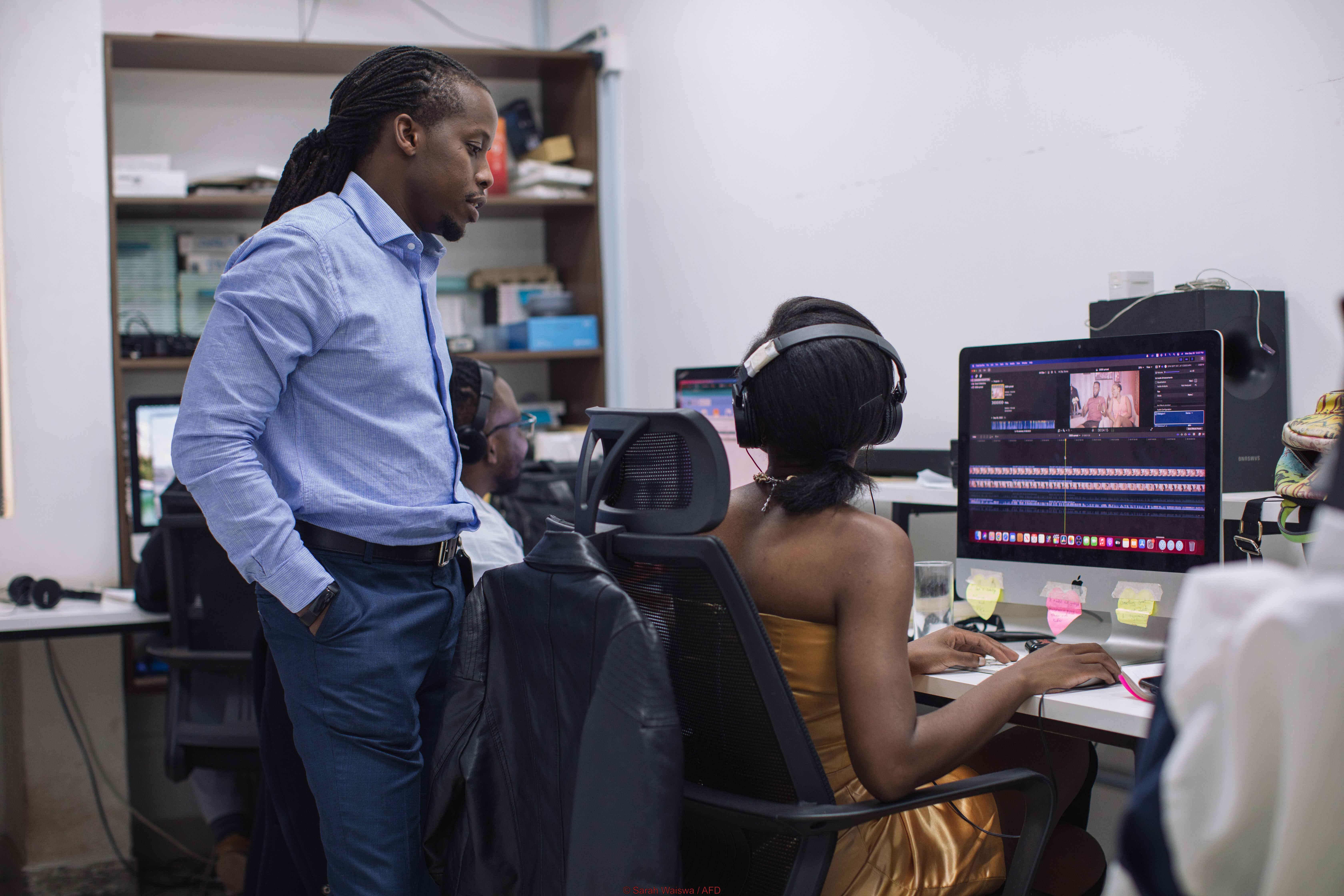Share the page
Our work in digital inclusion and accessibility

In a context of swift global digital transformation – where internet access has reached 67% worldwide but only 37% in Africa – we are witnessing a rise in digital use across numerous sectors. The transformative potential of digital technology is considerable. Indeed, it is already underway. In Sub-Saharan Africa alone, 230 million jobs will require digital skills by 2030, while 5,200 digital start-ups were founded in Africa between 2020 and 2021.
Although digital technology accelerates development pathways to achieve the Sustainable Development Goals (SDGs), it also fuels new inequalities and risks – both social and environmental. For instance, digital technologies account for 3 to 4% of greenhouse gas emissions according to a 2023 joint report by ADEME, the French Agency for Ecological Transition, and Arcep, France’s Regulatory Authority for Electronic Communications, Postal Affairs and Press Distribution.
15% of global GDP stems from the digital economy, although only 39% of young people aged 15–24 use the internet in low-income countries.
As France’s public agency for international development cooperation, we work with our partners to promote the dissemination of new technologies and to support an open, free, secure, innovative and inclusive digital world as a global public good. Our aim is to encourage a sustainable and inclusive digital transformation.
Our strategic priorities
International cooperation plays a vital role in fostering a more sustainable, secure, and inclusive digital transformation. It supports the sharing of good practices and knowledge, especially regarding policy in digital technology, regulation, cybersecurity, and the promotion of digital innovation.
Through international cooperation, we help to foster capacity building and to identify potentially high-impact digital inclusion projects in our partner countries. We also foster collective intelligence in digital governance on issues like personal data protection, environmental impact, and the societal repercussions of AI. Since 2024, we have prioritised three strategic areas which account for 60% of our digital inclusion and accessibility portfolio:
- Cybersecurity: Support national and regional institutions in establishing, improving and implementing legal and strategic cybersecurity frameworks and securing critical public infrastructure.
- E-governance: Assist our partners with digital transformation in national and local public services.
- Digital innovation: Encourage innovation and access to digital technology among public and private stakeholders, support local digital ecosystems and start-ups, and develop political frameworks that enable digital innovation.

Additional areas of interest include:
- Digital education and training: Support an inclusive digital transformation in education systems and expand digital skills, with a particular focus on digital inclusion.
- Digital health: Help our partners leverage digital transformation to improve public health and social protection.
We also work in emerging areas such as artificial intelligence and geospatial technologies. In the latter field, for example, we promote the use of geospatial data among public and private stakeholders. We do this by facilitating its use by start-ups for sustainable development, by setting up geospatial technology hubs, and by developing national and regional geospatial strategies.
Our digital inclusion projects align with the strategy of the Agence Française de Développement (AFD) Group. As such, the AFD Group and Expertise France offer a combined suite of digital services built around three major pillars: balance digital development with environmental goals; promote gender equality and digital inclusion for all; and place citizens’ rights at the heart of digital governance. We aim to:
- Deliver accessible, secure digital services
- Digitally transform essential services to achieve SDGs
- Foster digital inclusion and accessibility through job creation and innovative enterprises
- Strengthen digital innovation ecosystems
- Support digital transformation in the public sphere
- Enhance the security of digital spaces
- Promote the use of digital technologies in education and health
- Foster the development of digital financial services, AI, geospatial technology and digital skills
“The COVID-19 pandemic revealed how deeply our lives depend on digital technologies. Through the Digital4Development platform, Team Europe is forging global partnerships to ensure the digital revolution is an opportunity for all.”
- President of the European Commission

Our framework for action
Our action is guided by key French and European strategies in digital inclusion and accessibility. This is a priority area for the Presidential Council for International Partnerships in France, which has officially identified AI and space as critical sectors for the future.
Our action also aligns with the AFD Group’s 2021–2025 Digital Transition Strategy, the EU's Global Gateway initiative, and France’s International Digital Strategy, developed by the Ministry for Europe and Foreign Affairs.
Our services in this area
We offer a range of services to support the sustainable development of digital technology. These services focus on:
- Digital governance: We work in a variety of ways to support digital governance, modernise public services and promote regulatory frameworks. For example, our services contribute to the creation of digital “building blocks”, i.e. foundational components used in the development of digital solutions. We also support the emergence of digital public services and the strengthening of our partners’ digital capacities.
- Digital education: We support the development of digital infrastructure and services in education, training and employment through strategic infrastructure, high-speed internet, digital literacy programmes and access to digital technology in education and research.
- Cybersecurity: Cybercrime costs Africa €3.5 billion annually. For this reason, our agency has made it a priority to accelerate the adoption of new technologies in our partner countries to boost their cyber-resilience. We offer cybersecurity solutions tailored to the needs of our partners to strengthen their digital security and resilience to cyber threats.
- Artificial intelligence (AI): We support the development of sustainable, inclusive, neutral AI that limits biases. We do this to support economic growth, the green transition, the health and education systems, and our partners’ agricultural policies through the development of AI technologies in emerging and developing countries.
- Space: To strengthen France’s influence in the space sector and support our partner countries, we advocate for the creation of a financing mechanism to fund space expertise and develop a sustainable space sector in our partner countries. We do this by raising awareness, providing training, developing prototypes, offering technical assistance, supporting entrepreneurs, and deploying experts from French institutions, the private sector and the world of research.
We also draw on the services offered by the AFD Group. Their services support the development of digital networks and infrastructure, optimal government information systems and e-government, digital inclusion and gender equality, digital skills and jobs, as well as innovation and research. Their services also aim to reduce the effect of digital technology on climate change and to support the private sector and digital entrepreneurship, digital transformation across all sectors, cyber-resilience, and geospatial technology.
Resources for download
FAQ - More about digital inclusion and accessibility
Find out further information on digital inclusion and accessibility.
Digital development relies on a combination of infrastructure, public policy, and support mechanisms. Enabling tools include:
- Connectivity: digital planning frameworks, broadband strategies, regulation
- Public policy: cybersecurity, personal data protection, regulation of content and platforms, public innovation policies
- Support mechanisms: digital literacy training, digital mediation and inclusion, accessibility, and accreditation of innovation ecosystems (such as the “French Tech” label).
International cooperation helps ensure a more sustainable and inclusive digital transformation. Here are some practical examples of its benefits in the digital field:
- International cooperation enables the exchange and sharing of good practices and expertise, particularly in regulation, cybersecurity, and digital innovation
- It helps to apply collective intelligence to global digital governance challenges to help the sector develop suitable standards and address shared issues such as personal data protection, the environmental impact of digital technologies and the social effects of AI
- Digital development also facilitates both intercultural and economic exchange, and offers mutual benefits for citizen protection – especially regarding cybersecurity and safe digital spaces.
Expertise France’s action for sustainable digital development also helps French public and private ecosystems to become involved in large international programmes in innovative sectors such as space and artificial intelligence.
International cooperation combats cybercrime through common legal frameworks, operational collaboration, and shared investigation tools:
- In 2001, the Budapest Convention, the first international treaty in this area, helped harmonise legislation and promote judicial cooperation.
- That convention led to ambitious action within the European Union, such as the EU directive on security of network and information systems (NIS Directive), the creation of the European Cybercrime Centre (EC3) and the Cybersecurity Act.
- At a global level, in 2024, the United Nations adopted the first Convention against Cybercrime. This treaty strengthens the exchange of electronic evidence, judicial cooperation, child protection against online violence, victim support, and prevention via global strategies and 24/7 mutual assistance mechanisms between states.
The digital transformation is a key pillar of global economic and social development. However, the rapid growth and emergence of new uses and technologies can generate significant inequalities and bring about economic, social, societal, and environmental risks.
The AFD Group supports a digital transformation that aligns with sustainable and inclusive development principles:
- Freedom for partner states to secure their digital sovereignty, and for citizens to have open and safe digital access
- Accessibility for all, with a focus on digital inclusion for women and the most vulnerable
- Responsibility through secure systems that respect personal data protection and environmental concerns
To ensure a fair digital transformation, the AFD Group promotes an inclusive, responsible, and sustainable approach. This involves reducing the digital divide, particularly by improving access to the internet and online services for marginalised groups. It also means developing digital literacy and supporting essential digital public services in education, health and employment.
A fair digital transformation also requires us to develop stronger digital rights in personal data protection, to combat disinformation, to promote online public participation, and to ensure safe digital practices. Environmental considerations are key too, such as reducing electronic waste and decarbonising infrastructure (like data centres).
Finally, a fair digital transformation cannot exist without democratic governance, which is built on solid regulatory frameworks, respect for digital sovereignty, and an innovation ecosystem that is open to all. This is the guiding vision behind the AFD Group and Expertise France’s work in developing digital technology as a global public good.
Key figures in 2024
- 32 projects with a significant digital component
- €74 million in projects with a significant digital component (vs €14 million in 2023)
- 615 organisations received support in digital transformation and the use of digital technology
- 1,718 people received training in digital literacy to support democratic, economic and financial governance
